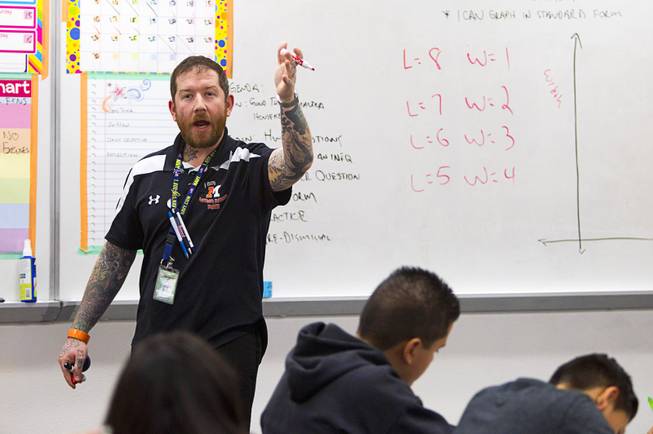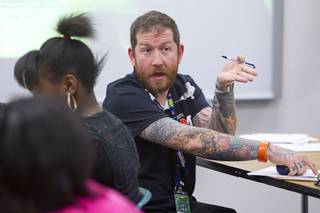
Mojave High School teacher Jacob Kepins teaches an algebra class at the school Wednesday, Nov. 19, 2014.
Sunday, Nov. 30, 2014 | 2 a.m.
Every day before Mojave High School teacher Jacob Kepins begins breaking down algebraic equations, he has students stand up and recite a mantra.
“Better today than yesterday,” the students say. “Better tomorrow than today.”
The words are a verbal contract to help students remember learning is their objective. The chant is a technique Kepins picked up in the Navy.
Learn More
Find more information on the “You Served For America, Now Teach For America” initiative at teachforamerica.org
“I treat them like they’re my sailors, and I have a mission,” Kepins said. “That mission is to get you ready for college and ready for a career and life outside of college.”
Kepins is in his second year of teaching at Mojave through Teach For America’s “You Served For America, Now Teach For America” initiative, which recruits veterans and their spouses to enter classrooms. Teach For America is a nonprofit organization that provides training and support to recent college graduates in return for a two-year commitment to teach in low-income schools.
The veterans program, which began in 2012, offers an outlet to veterans as they transition into civilian life. The recruits’ experience in the military fits well in schools, where leadership, perseverance and the ability to multitask are key, said program director and Navy veteran Sid Ellington.
“There is so much going around you that you need to just focus on the mission at hand and avoid the distraction,” said Ellington, who taught in New Orleans. “Those skills were honed in the military — that leadership, that ability to be prepared and show up prepared.”
There are about 100 veterans and 35 spouses teaching nationwide through the program, with nine veterans and two military spouses teaching in Clark County. Ellington helps participants transition into teaching, including helping them become accredited and find a job.
Eventually, Ellington hopes to expand the number of veteran teachers to about 265, or 5 percent of Teach For America’s annual workforce.
It’s a challenging job, he admits. He has had students die in shootings, but his time in the classroom also enabled him to make a difference in something bigger than himself, he said.
“It was a life-changing experience,” Ellington said.
Before teaching, Kepins spent seven years in the Navy as a ship electrician on the USS Boxer in the Persian Gulf. It was his job to ensure that the generator remained operational.
After leaving the Navy and working for two years as a tattoo artist, he used the G.I. Bill to enroll in college and study economics. He learned about Teach For America during his junior year economics class.
Education “is this game changer, this universal leveling mechanism in terms of social mobility and income equality,” Kepins said. “I wanted to get in there and do something.”
In some ways, it has been tougher than his time in the military. His mission on the ship was simple — fix machines. It could be physically exhausting, but the job was straightforward.
At Mojave, he teaches students with diverse backgrounds, including many who come from low-income families. Each student needs to be treated differently, and there is no standard operating procedure to fall back on.
“These are real students with a real future, and they depend on you to be there for them and give them the right information to be successful in their lives,” Kepins said. “There’s no do-over.”


Join the Discussion:
Check this out for a full explanation of our conversion to the LiveFyre commenting system and instructions on how to sign up for an account.
Full comments policy